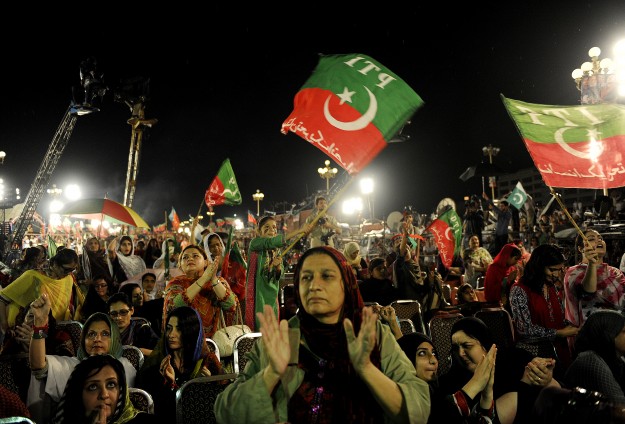Clashes between Pakistani anti-government protesters and police resumed in the capital Islamabad late on Monday afternoon with security forces firing teargas to stop demonstrators trying to reach Premier’s residence.
 Clashes between Pakistani anti-government protesters and police resumed in the capital Islamabad late on Monday afternoon with security forces firing teargas to stop demonstrators trying to reach Prime Minister Nawaz Sharif's residence.
Clashes between Pakistani anti-government protesters and police resumed in the capital Islamabad late on Monday afternoon with security forces firing teargas to stop demonstrators trying to reach Prime Minister Nawaz Sharif's residence.
Pakistan is preparing to launch a selective crackdown against anti-government protesters trying to bring down the government of Prime Minister Nawaz Sharif, the defense minister said, warning demonstrators against storming government buildings.
Dashing chances of a peace deal between the government and protest leaders Imran Khan and Tahir ul-Qadri, anti-government protesters stormed the state television building in the heart of the heavily guarded capital earlier on Monday.
Protesters have also tried to march on Sharif's residence.
Defense Minister Khawaja Asif told Reuters that the government would not hesitate to enforce its writ and was considering cracking down against those attacking state institutions.
"If not mass arrests, selective use of force can be used," Asif said, describing one option the government may decide to exercise following a meeting between the prime minister and his top aides.
Asif, considered to be in favor of talks, is one of a growing number of members of Sharif's cabinet who believe it is time for tougher action against thousands of protesters massed in Islamabad to demand the prime minister step down.
Round after round of negotiations have failed to end the crisis that has gripped Pakistan for more than two weeks, with Khan and Qadri saying they will not back down unless Sharif resigns.
The army is bound to play a key role in how the conflict unfolds. In a brief statement late on Sunday, the army reaffirmed its commitment to democracy and said the crisis had to be solved politically.
"Further use of force will only aggravate the problem. It was once again reiterated that the situation should be resolved politically without wasting any time and without recourse to violent means," it said.
A weakened Sharif would allow the army to remain firmly in charge of key issues such as relations with India and Afghanistan while allowing the civilian government to deal with day-to-day economic issues in which it has little interest.